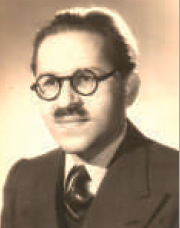K. G. Saiyidain
This is a collection of articles archived for the excellence of their content. Readers will be able to edit existing articles and post new articles directly |
India Harmony VOLUME - 1 : ISSUE - 5 JULY-AUGUST, 2012
Late Dr. K. G. Saiyadain was the grandson of Maulana Hali. Educated at AMU, he was an outstanding scholar and writer. He rose to the position of Secretary, Ministry of Education and acquitted himself with great honour.
K. G. Saiyadain
First, I shall just mention the three most outstanding contributions of Khwaja Ghulam-us- Saiyidain (KGS) to India and the world in the field of Education. I shall then try to describe the roots of the environment of the city where KGS was born and where his forefathers had lived for more than six hundred years and contributed to the sprouting the those roots. What possible influence these roots may have exerted to shape the personality and achievements of KGS, I would leave to the judgement of my readers.
KGS was first and foremost, an educationist. He was a valiant crusader for the spread of knowledge. Not only that, he held that an educated person should be a person of character and integrity.
Integrity is a quality that can only emanate from having some kind of a coherent philosophy of life – you may call it a well-rounded worldwide or weltanschauung. On the other hand, character is founded upon the courage of conviction of one's belief's and philosophy of life, one's capability to act upon one's beliefs in the face of difficulties.
Khwaja Ghulam-us-saiyidain and his grand father, the famous poet and reformer Altaf Hussain Hali are among the descendents of the latter.
The town retained its status as a place for religious learning for hundreds of years. Kings and ministers, the rich and poor alike came to the town to pay tribute to the sufi saints.
The traditional languages of education in Panipat were Persian and Arabic.
However the leading families of Panipat embarked upon the study of English as soon as the opportunity came their way after 1857. More than a decade before Sir Syed Ahmad Khan established the MAO College, the boys from at least two leading families of Panipat were preparing themselves to study English, Medicine and Engineering. Altaf Hussain Hali's son Khwaja Sajjad Hussain was among the first graduating class of the MAO College. Hakim Haider Hasan's sons Sharif Hasan and Latif Hasan, only a few years younger than Sajjad Hussain, went to Lahore and Roorkee respectively, to study Medicine and Engineering. The eighteen sixties saw Panipat turning a new leaf in its long tradition of learning. Its face partially turned towards the west.
Zeal for education flowed in the blood of Panipatis. Originally it was education restricted to the field of religion and its related disciplines like logic, history, medicine etc. Then times changed. Sajjad Hussain, perhaps the first role model of KGS, adopted modern Education as his career. In his own way he was advancing the reforms that his father the great Altaf Hussain Hali was advocating as a colleague of Sir Syed. In the next generation, it seemed natural for KGS to don the mantle of his illustrious elders.
For KGS new vistas emerged from the contours of peace and non-violence, the values sought for hundreds of years by the people of his town. Also, if they were to be effective in amending or replacing well established constructs, they had to be a part of the emerging paradigm of religion and philosophy. Further, in the formulation and advocacy of new directions, the individual human being had to have the central role, in consonance with the teachings of Bu-Ali Shah Qalandar, the patron saint of Panipat. In short, there had to be a reinterpretation of the Islamic faith.
KGS accepted the thesis proposed by Iqbal in his famous lectures Reconstruction of Religious Thought in Islam that apart from the Deduction and Induction there was also a third source of knowledge. Transcendental Knowledge. This knowledge was accessible only to those saintly persons who have passed through certain stages of their journey towards the Infinite, in short the knowledge of the Sufis and Saints.
That the searching intellect of KGS should turn towards M. K. Gandhi, an apostle of peace and non-violence was only natural. The rest is history.


